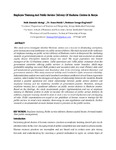| dc.description.abstract | This study set to investigate whether Huduma centres are a success in eliminating corruption, petty bureaucracy and inefficiency in public service delivery. The study focused on the influence of employee training on public service delivery of Huduma centres in Kenya and the mediating variable of government policies on public service delivery. The study was anchored on Human capital theory. Descriptive research design was used. The target population was branch managers of the 52 Huduma centres, 1456 supervisors and 1456 public customers from the government ministries offering public services in huduma centre branches. Multi-stage probability sampling was used. Both primary and secondary data was used. Primary data used self-administered questionnaires and Secondary data from reviewing relevant literature and government statistics. Pilot study measured validity and Cronbach’s alpha measured reliability. Inferential data analysis was used and it involved correlation coefficient (r) and linear regression analysis, which looked for the strength and degree of relationship between the variables. Results showed a positive significant low linear relationship between public service delivery and employee training and the mediating variable of government policies. Therefore, strategic employee training has a significant influence on public service delivery in Huduma centres. Based on the findings, the study recommends proper implementation and use of employee training in Huduma centres in order to increase the efficiency of public service delivery. In addition, employee training should be done in such a way to avoid duplication and overlapping of roles. Public organisations are urged to use guidelines of human resource strategy for the public service, to avoid every ministry, from using its own regulations and standards. Further research is recommended on more human resource practices in the public service. | en_US |

